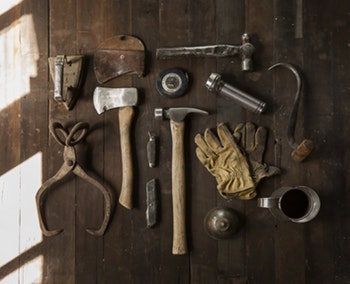Employers and Universities: Work with us?

What will I learn on carpentry and joinery apprenticeships?
Carpenters and joiners are responsible for fitting interiors in bars, making beautiful furniture, creating stage sets for movies – and everything in between.
It’s an in-demand, highly skilled trade where you rely on your talents and technical ability to make a great career. You could even go on to run a business and be your own boss.
Carpentry and joinery apprenticeships mean you can get started straight from school. Here we’ll look at joinery apprenticeships and carpentry apprenticeships, what they’ll teach you and whether they’re right for you.
'Good with your hands? A creative spark? Joinery is a well-paid, in-demand and skilled career'
What are carpenters and joiners?
Carpenters and joiners make and install wooden fittings, furniture and other structures. Joiners usually make the wooden products, for example doors or window frames, and then carpenters would install them in a building.
Depending on their employer and where they work, the tasks of a carpenter or joiner could include:
- Following instructions from plan.
- Cutting and shaping wood (timber) for door frames, staircases, window frames, floorboards, roof timbers, and other structures.
- Installing kitchens, shelves and closets.
- Making and fitting interiors for shops, bars, cafes, offices and other public buildings.
- Making and fitting stage sets for theatre, TV and movie productions.
What are apprenticeships in carpentry and joinery?
During an apprenticeship, you will have an employer so you learn on the job, whilst also studying at college for a qualification. You’ll earn an apprentice wage while you learn. Read this to learn all about apprenticeships.
Joinery apprenticeships mean you would be employed in a workshop, making wooden building components like doors, windows and staircases.
Carpentry apprenticeships will usually see you work on a building site, preparing and fixing building components and then installing fixtures.
Carpentry and joinery apprenticeships are available at both the intermediate and advanced levels. Read this to understand the different types of apprenticeships.
What will apprenticeships in carpentry and joinery teach me?
Both carpentry and joinery apprenticeships will teach you how to:
- Work safely and know about important health and safety issues.
- Move, handle and store wooden materials and components.
- Understand and follow verbal and written instructions from your bosses.
- Select materials for specific projects, like the correct timber, tools and fixings.
After completing the carpentry apprenticeship, you’ll know how to:

- Carry out a range of technical tasks including measuring, marking out, fitting, cutting, splicing, finishing, positioning and securing.
- Install door and window frames, door and hatch linings, floor joist coverings, straight partitions and straight staircases.
- Install doors, ironmongery, service encasements, wall and floor units and fitments, cladding and staircase components.
- Repair or replace frames, mouldings, doors, windows, door and window ironmongery, roofing components, guttering and downpipes and window components.
- Use, maintain and store hand tools, power tools and other equipment.
And after completing the joinery apprenticeship, you’ll know how to:
- Do different technical tasks like drawing, measuring, marking out, fitting, finishing, positioning and securing.
- Follow plans to prepare timber for the manufacture of doors, windows and opening lights, units and/or fitments and staircases.
- Create, fit and assemble components to manufacture doors, windows and staircases.
- Use, maintain and store specific architectural joinery tools and equipment, such as marking and testing tools, power tools and hand tools.
At the same time you’ll be studying towards a professional qualification such as the NVQ Level 2 in Construction or the NVQ level 2 in Wood Occupations.
You’ll also gain important transferable skills like group working skills, communication, and time management.
Are apprenticeships in carpentry and joinery right for me?
Here’s a list of qualities you’ll need to help you see if these apprenticeships are a good fit for you:
- Keen to learn with a positive attitude.
- Motivated and willing to do the best job you can.
- Able to closely follow instructions.
- Honest, reliable and hard-working.
- Able to work well in a team and keen to improve your people skills.
- Good numeracy skills.

in joinery and carpentry
- Friendly and approachable.
- Interested in joinery and carpentry.
- Understands the importance of using your initiative.
You usually won’t need any prior qualifications for the intermediate level apprenticeship, though some employers will want you to have GCSEs at grade 4 or above in English and maths.
You may also need a driving license – check the job listing for specific requirements. Many apprenticeships will lead to a permanent job. Get your search started here.
You might also like...
Your complete guide to engineering apprenticeships
Could a construction apprenticeship be for you?
Image credits
Main image via Freepik
